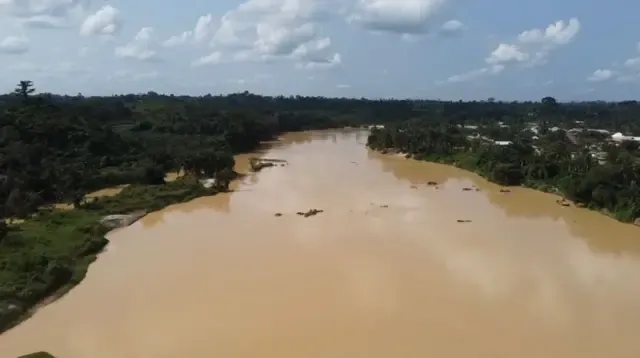
Ghana, rich in mineral resources, has long been a hub for gold mining. However, alongside the official mining sector, illegal small-scale mining—known locally as galamsey—has emerged as a serious issue. While galamsey provides livelihoods for thousands of people, it has devastating consequences for the environment, public health, and Ghana's economy. Here, we explore the multifaceted impacts of galamsey and the challenges faced in curbing this illicit industry.
- Environmental Destruction
One of the most immediate and visible impacts of galamsey is the environmental damage it causes. The operations often involve clear-cutting forests and excavating large swathes of land, resulting in severe deforestation and the destruction of arable land. Rivers and streams, which are essential sources of drinking water for communities, become heavily polluted by chemicals like mercury and cyanide, which are commonly used in the gold extraction process. This pollution not only destroys aquatic ecosystems but also renders water unsafe for consumption and farming, affecting entire communities that rely on these water bodies for daily use.
The environmental degradation caused by galamsey has lasting consequences. Reclaiming and rehabilitating these lands is an expensive and time-consuming process, putting immense strain on Ghana’s resources and its biodiversity.
- Public Health Risks
The health risks associated with galamsey are widespread and severe. The chemicals used, such as mercury, pose serious health risks not only to the miners themselves but also to people living nearby. Mercury, for instance, is highly toxic and can lead to respiratory issues, skin diseases, and neurological damage. Through polluted rivers and streams, mercury and other toxins enter the food chain, contaminating fish and crops and threatening human health on a much larger scale.
Communities reliant on water sources polluted by galamsey face significant health risks daily. Medical services in these rural areas are often limited, which makes treating illnesses related to water contamination challenging. The cost of treating these health problems, both to individuals and to the government, is another hidden economic burden of galamsey.
- Economic Costs
While galamsey offers economic opportunities for many who might otherwise be unemployed, it has hidden economic costs that affect the nation as a whole. One of the biggest issues is the loss of arable land. As mining operations consume farmland, agriculture suffers, affecting local food production and security. Additionally, the government loses significant revenue because galamsey operations typically evade taxes, depriving the country of funds that could otherwise support public services and infrastructure.
The destruction of farmland also forces Ghana to rely more on food imports, further affecting the country’s economic stability. Over time, these hidden economic costs may outweigh the temporary benefits that galamsey provides to individuals and communities.
- Crime and Social Issues
The rise of galamsey has led to increased crime and social issues in mining regions. Illegal mining creates an environment where crime, exploitation, and violence can flourish, often putting local communities at risk. Conflicts frequently arise between legal mining companies and illegal miners, leading to confrontations that sometimes escalate to violence. The government’s response, including deploying security forces like Operation Vanguard, has faced criticism, with reports of human rights abuses adding another layer of tension.
Additionally, galamsey often brings an influx of transient workers who lack ties to the local community, leading to strained social services and sometimes disrupting community cohesion.
- Challenges in Policy and Enforcement
The Ghanaian government has introduced multiple initiatives aimed at combating galamsey, including establishing anti-galamsey task forces and stricter mining regulations. However, enforcing these measures remains a significant challenge. Corruption, political interference, and limited resources make it difficult to effectively monitor and control illegal mining activities.
For instance, despite the formation of Operation Vanguard and other anti-galamsey efforts, illegal mining persists in part due to corruption within the very agencies tasked with enforcement. This undercuts the government’s credibility and makes local communities distrustful of both government initiatives and large-scale mining operations.
- Impact on Climate Goals
The environmental destruction from galamsey has an impact beyond Ghana's borders. As forests are cleared and water sources polluted, Ghana's ability to meet its climate goals becomes compromised. Deforestation contributes to greenhouse gas emissions, while degraded land loses its ability to absorb carbon, exacerbating the effects of climate change.
Galamsey’s contribution to environmental degradation makes it harder for Ghana to fulfill its commitments to climate action, such as those under the Paris Agreement. Reversing this damage will take significant resources and political will, making sustainable solutions to galamsey all the more urgent.
Toward a Sustainable Solution
Addressing the galamsey crisis requires a multifaceted and sustained approach. Some potential solutions include:
- Stricter Regulation and Enforcement: Increasing accountability and transparency in law enforcement can help curb illegal mining. This might involve tracking resources more effectively, rooting out corruption, and holding offenders accountable.
- Community Engagement: Involving local communities in decision-making processes ensures that anti-galamsey policies consider the needs of those directly impacted. Education and awareness campaigns can also highlight the long-term environmental and health impacts of galamsey.
- Alternative Livelihoods: For many engaged in galamsey, mining is a means of survival. Providing alternative livelihoods, such as sustainable agriculture or vocational training, can help reduce the economic incentives driving illegal mining.
- Rehabilitation and Conservation: Investing in land rehabilitation and water purification can help restore the environment, though these measures are costly and take time. Partnering with international conservation organizations could support these efforts.
Final Thoughts
The galamsey crisis in Ghana presents a complex web of environmental, health, social, and economic challenges. While addressing galamsey requires a significant commitment from the government, it also calls for the involvement of local communities, private industries, and international partners. Only through a comprehensive and sustainable approach can Ghana hope to mitigate the devastating impacts of galamsey, protect its natural resources, and secure a healthier, more prosperous future for its people.